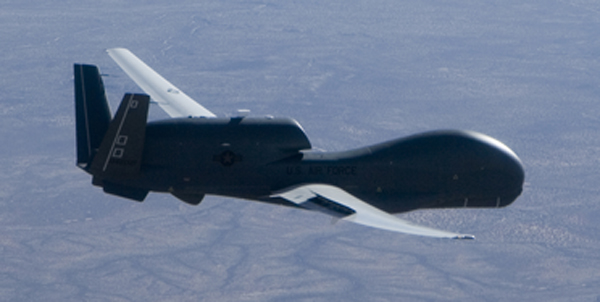The Obama administration has begun consulting Congress on plans to sell Global Hawk surveillance planes to South Korea, which came close to all-out war with North Korea last year.
Among those briefed have been the Senate’s and House of Representatives’ foreign affairs committees, which have jurisdiction over arms sales.There was no immediate word on when formal notification of a proposed sale might take place, nor on the potential overall value.
Northrop Grumman said that Seoul was considering buying four RQ-4 Global Hawk “Block 30” drones, which can carry intelligence, surveillance and reconnaissance payloads. Associated ground stations would be included in such a sale, Gemma Loochkartt, a company spokeswoman, said by email on Wednesday. Deliveries could take place in 2014 and 2015 if a government-to-government deal is signed this year, she said.
The Block 30 airframes sell for roughly $30 million apiece, not including their payloads. Raytheon Co’s “Enhanced Integrated Sensor Suite” lets the aircraft scan large swaths and transmit imagery from 60,000 feet in near real-time using electro-optical, infrared and radar-imaging sensors.
The State Department declined to comment pending formal notification of a proposed sale to Congress. The U.S. Air Force, which would broker the deal, and South Korea’s embassy in Washington also had no immediate comment.
An official at the South Korean Defence Ministry’s procurement agency said it remains interested in acquiring the aircraft system and is waiting for Washington to have a formal go-ahead to negotiate the sale. “Our interest is based on the operational need of our military,” the official said.
The head of the Defence Acquisition Programme Administration Noh Dae-lae had earlier expressed concern about the system’s reliability after reports about the aircraft’s technical shortfalls in May.
The Global Hawk is due to replace the Cold War-vintage U-2 spy plane in 2015, Lieutenant Colonel Rick Thomas, the U.S. Air Force’s Global Hawk functional manager, told reporters on August 10. Japan, Singapore and Australia also have shown interest in acquiring Global Hawk, Loochkartt said.
Global Hawk’s export would require a waiver under the Missile Technology Control Regime. The MTCR is a voluntary pact among at least 34 countries aimed at curbing the spread of unmanned delivery systems that could be used for weapons of mass destruction. The aircraft’s range — 12,300 nautical miles — and payload capacity — 3,000 pounds (1,360 kg) — subject it to the arms control agreement created in 1987.
Then-Defence Secretary Robert Gates said in October 2008 that the United States was “very sympathetic” to South Korea’s interest in Global Hawk but added that there were MTCR issues to overcome.
Wes Bush, Northrop Grumman’s chief executive, complained in an August 17 speech that export curbs on unmanned systems were harming U.S. industry without making the United States any safer.
“The good news,” he said, “is that the Defense Department is promoting what is clearly the best export reform policy — build higher walls around fewer things.”
Source: Reuters

